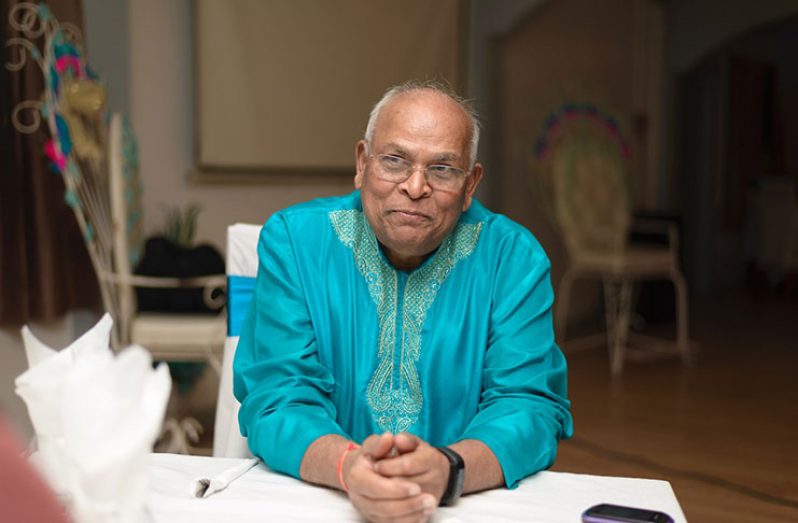Dear Editor,
On January 8, 2024, the Guyana Hindu Dharmic Sabha (Dharmic Sabha) celebrated its 50th anniversary, which included a carefully choreographed interview by the current President of the organization, Dr. Vindya Persaud, the daughter of its Founding leader, the late Pandit Reepu Daman Persaud.
Dr. Persaud painted quite a rosy picture of the achievements of the Dharmic Sabha, pointing to the support of “over one hundred temples” with which it coordinates activities across the country in nine Prants. The wide-ranging activities, she boasted, include: (i) online Sanskrit classes (Dharmic Vidya); (ii) Bacho Ka Satsang, a program to benefit young children ; (ii) Chowtal and Taan singing; (iii) Prarthana Satsang; (iv); training of pandits; (v) the promotion of cultural programs through Sanskritic Kendra; (vi) planning and execution of cultural shows through Naya Zamana; (vii); and the engagement in inter-religious dialogue and cultural exchanges. In addition, according to Dr. Persaud, the Sabha runs a creche, a nursery and a primary school, and a secondary school will be opened shortly. Dharmic Sabha, over the years, has promoted the Phagwah and Diwali festivals, and recognizes Indian Arrival Day.
Dr. Persaud noted with pride, the Government of India’s recognition of the Sabha’s “outstanding contribution to community service.” She personally received the Pravasi Samman Award for the Sabha at the Pravasi Bharatiya Divas Convention in 2019 from the Indian President, Shri Ram Nath Kovind. Dharmic Sabha is closely aligned to the current PPP government for which Dr. Persaud serves as a Cabinet member, a position that holds some diplomatic sway with the Indian High Commission which advises the Indian government on nominees for the Pravasi Samman Award.
Currently, Dharmic Sabha has restricted itself to being an urban-focused institution, with most of its activities, as described by Dr. Persaud, concentrated exclusively in Georgetown. Such a central location, which houses the seat of government, foreign embassies, and Guyana’s mass media, allows a politically connected organization to spin its web of publicity, creating the impression that it is mass-based. One needs only to visit the different Prants (regional bodies) in the countryside to realize that “support from over 100 temples” is a hoax. Additionally, most of the temples, whose attendances are abysmal, do not have priests, again putting a lie to the empty boast that Dharmic Sabha is training priests. In fact, an older priest on West Coast Demerara, whose organization is not affiliated to the Dharmic Sabha has been offering training for priests, most of whom operate as freelance pandits.
The waning state of Hindu pride, dilution of Hindu values, sharp decline in attendance at temples, lack of inter-temple activities, and rapid conversion of Hindus to other religions expose the farce portrayed by the Dharma Sabha that its transformational influence is far-reaching. In the 1970s, the Dharmic Sabha took on a dual role: one of filling the religious void resulting from the open declaration of loyalty to the PNC by the Sanatana Dharma Maha Sabha and the Pandits Council, considering that most Hindus at the time were supporters of the PPP; and two, it served as a guardian of an important vote-bank, Hindu devotees, of the PPP. The latter role has diluted considerably due to the hardened ethnic and racial alignment of voters to the two major political parties, and the shrinking influence of the Dharmic Sabha due to its drastically contracted reach.
The adversarial political climate in Guyana in the 70s and 80s, spurred by racially inspired policies of the PNC government witnessed a rise in enthusiasm by disenfranchised groups for opposition forces. The Dharmic Sabha which had aligned itself to the PPP benefited from the wave of enthusiasm, especially since it offered spiritual inspiration and succor to frustrated and fearful devotees. However, the advent of a PPP government in 1992 saw Pandit Reepu Daman Persaud, a senior Party leader assuming greater political responsibilities, which in effect denied the Sabha the organizational energy and leadership attention it needed at a crucial time.
Development of cracks within the Dharmic Sabha exposed the single-handed grip on power, reluctance to trust and recognize the capabilities of other leaders within the central command, the absence of a training program for priests, and lack of effort to groom effective regional leaders to replace a number of those that had migrated overseas. Additionally, the pig-headed arrogance and/or paranoia to work with other Hindu organizations, which now hardly pose a political threat, has not only damaged the Sabha’s credibility, but has undermined a coordinated drive to propagate Hinduism in Guyana. The weakening health of an aging Founding leader, who was succeeded by his daughter, following his passing, dealt a further blow to the Dharmic Sabha because she lacks his charisma and cohesive grassroot skills, although she also holds a leadership role in the PPP government.
The high incidence of suicides and unrestrained intake of alcohol among Hindus, compared to other ethnic groups, are not of recent origin, but have been made worse due to a lack of will and the absence of effective leadership to establish the educational structures and training to address these issues. A society riven by these problems has witnessed a growth in female abuse, mounting loneliness and depression, higher levels of divorce, neglect of children’s needs resulting from a growing single-parent syndrome, and a decrease in men’s participation in Hindu activities, all of which have made Hindus vulnerable to aggressive proselytizing ruses.
The analyses in this article and another which I had written weeks ago expose the impact that the major religious organizations have had on the sorry state of Hindu practice today in Guyana. Those who wish to seek corrective action may need to penetrate the façade behind the publicity stunts put on by these organizations. Some good has come out of the work done by each, but it is residual to the personal satisfaction and the fulfillment of the political ambitions of the leaders.
Ramdular
